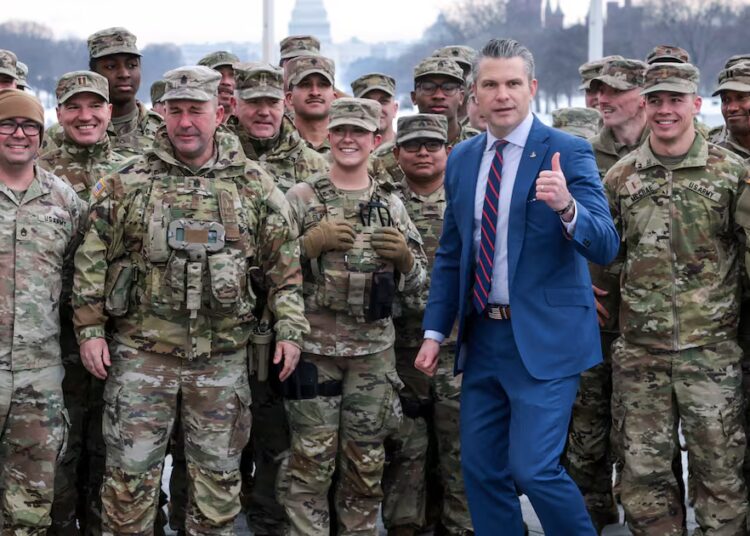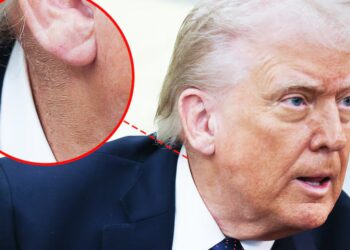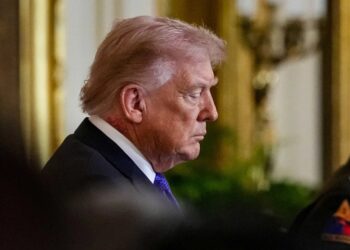President Trump talks like an economic populist, forever promising to help consumers, small business owners and, especially, workers. He has stocked his administration with populist Republicans, including the vice president and the labor secretary. To celebrate Labor Day this year, he declared himself “the champion of the American Worker.”
But in his second term, as in his first, Mr. Trump is failing to deliver on all that talk.
The Trump administration is decimating the federal agencies that police corporations and protect workers and consumers. Even as it has delivered large tax breaks to corporations, it is seeking to undermine unions and to strip workers of legal protections. And under Mr. Trump, there is mounting evidence that the government is cynically wielding its antitrust authority — one of the most important checks on excesses of corporate power — as a means of punishing its enemies, rewarding its friends and consolidating Mr. Trump’s political authority.
This abuse of antitrust authority is especially disappointing and worrisome. People close to Mr. Trump, including Vice President JD Vance, had indicated they were a different breed of Republican — one that recognized the dangers of excessively powerful corporations. They suggested that they might continue the Biden administration’s increased scrutiny of mergers and corporate behemoths in the name of protecting workers and consumers. Instead, the Trump administration is using its antitrust powers mostly to protect Mr. Trump.
Consider a pair of media mergers, one recently completed and one still in progress.
The marriage of the media conglomerate Paramount and the movie studio Skydance is not the kind of deal the government typically tries to prevent. The new company is a big fish, but in a pond where it will compete with plenty of other big fish, such as Amazon and Disney. Still, Mr. Trump’s F.C.C. chairman, Brendan Carr, decided that the deal required special scrutiny.
Before the agency granted its approval, it required the company to hire a “bias monitor” for its CBS News division and to forswear diversity, equity and inclusion programs. Paramount also paid Mr. Trump, personally, $16 million to settle a lawsuit he had filed charging that CBS News was biased in its coverage of his 2024 candidacy, and it announced the end of a show featuring the comedian Stephen Colbert, perhaps best known for his ability to make people laugh at Mr. Trump. The network said the show had financial challenges.
None of that was regulation in the public interest. It was a mixture of the Republican campaign against diversity initiatives and Mr. Trump’s campaign to pressure media companies to cover him more favorably. We agree with Anna M. Gomez, the sole Democrat on the F.C.C.’s board, who criticized the agency for “imposing never-before-seen controls over newsroom decisions and editorial judgment, in direct violation of the First Amendment and the law.”
Even as it has squeezed Paramount, the F.C.C. is working to clear the way for a media merger that should have raised concerns about the concentration of corporate power. Nexstar, a large owner of local television stations, is seeking approval to acquire Tegna, another owner of many stations. Under the agency’s rules, companies are not allowed to own stations that reach a combined total of more than 39 percent of U.S. households. The combination of Nexstar and Tegna would blow past that threshold, reaching 80 percent of households. But Mr. Carr is moving to eliminate those restrictions, which he has described as “arcane, artificial limits.” In June, the agency requested public comment on raising or removing the cap, the first step in rewriting the rule.
A company that owns a lot of TV stations can more easily charge higher prices for advertising, and there are fewer competitors to bid up the salaries of, say, its meteorologists. The government also has long imposed special limits on the ownership of television stations to limit the power any one company can exert over what Americans see on their TVs. Nexstar, however, is a conservative company that has allied itself with the administration’s political goals. In September, Mr. Carr celebrated the company’s role in pressuring Disney to suspend Jimmy Kimmel, another comedian who hosts a late-night show, this one on ABC, and who ran afoul of Mr. Trump and his allies.
There is another, subtler reason for Americans to oppose this kind of media consolidation. One of the bitter lessons of the past century is that authoritarian regimes have often relied on the concentration of corporate power to consolidate political power. The consolidation of media ownership makes the government more powerful, because it is easier to pressure a few big companies than a fragmented host of independently owned stations. That possibility is not merely theoretical when the president is attempting to intimidate the media in myriad ways.
Outside the media, the Trump administration has shown little interest in curbing corporate power. The administration initially seemed as if it might continue the Biden administration’s efforts to reinvigorate antitrust enforcement. Gail Slater, chosen by Mr. Trump to lead the Justice Department’s antitrust division, has publicly rejected the laissez faire antitrust policies of past Republican administrations, arguing correctly that the government must enforce antitrust laws to maintain competitive markets. “One cannot wish away monopolies and cartels with false economic theories of self-correction,” she said in April.
In some cases, the Trump administration has acted on those principles. It has maintained the stricter guidelines for evaluating proposed mergers that the Biden administration issued in 2023. The Justice Department continued to pursue an antitrust case against RealPage, a Texas company accused of orchestrating what amounts to a landlord cartel by persuading building owners to use its software to set prices for millions of apartments across the country. On Monday, Ms. Slater announced a settlement that forces RealPage to change its business model. The department also carried forward an antitrust case against Google, arguing that the company should be forced to divest its Web browser. (The decision by a federal judge in September to impose more modest remedies was a reminder that the courts remain an obstacle to antitrust enforcement no matter who is in the White House.)
But the Trump record is mostly disappointing. In July, the Justice Department fired two of Ms. Slater’s top deputies after they objected to the department’s decision to allow the technology company Hewlett Packard Enterprise to acquire one of its chief rivals, Juniper Networks. Hewlett Packard hired a number of lobbyists with close ties to Mr. Trump, who negotiated with aides to the attorney general, Pam Bondi, bypassing the department’s antitrust lawyers.
Regulators also have set aside efforts to protect workers and small businesses.
Under President Joe Biden, the F.T.C. issued a rule banning noncompete clauses, which employers use to inhibit workers from moving to better-paying jobs. That has the effect of suppressing wages. The clauses, once found only in the contracts of executives or especially valuable workers, are now regularly imposed on low-wage workers in industries like hairstyling or fast food. Businesses had challenged the agency in court, and in September, the F.T.C. said it would abandon efforts to defend the ban on noncompete clauses.
In January 2025, in one of the Biden administration’s final acts of antitrust enforcement, the F.T.C. sued Pepsi, arguing that the company was offering better deals to Walmart than to smaller grocers, placing smaller firms at a competitive disadvantage. The lawsuit, along with another action against an alcohol distributor a few weeks earlier, were part of an effort to resurrect the Robinson-Patman Act. The law, written in the 1930s to protect small businesses from unfair competition by big firms, had not been invoked in almost a quarter century.
This spring, the F.T.C. dismissed the Pepsi lawsuit.
Congress enacted the nation’s antitrust laws to ensure that private power did not become so concentrated as to threaten the public interest. Government took the side of the people against the powerful. In the words of Senator John Sherman, the author and namesake of the nation’s first major antitrust law, “If we will not endure a king as a political power, we should not endure a king over the production, transportation and sale of the necessaries of life.”
Under the cover of populist rhetoric, Mr. Trump is subverting the nation’s longstanding commitment to those principles. In his hands, laws created to limit the concentration of economic and political power are being used to further its concentration. This administration is not governing in the interest of the people. It is acting in the interest of Mr. Trump.
The Times is committed to publishing a diversity of letters to the editor. We’d like to hear what you think about this or any of our articles. Here are some tips. And here’s our email: [email protected].
Follow the New York Times Opinion section on Facebook, Instagram, TikTok, Bluesky, WhatsApp and Threads.
The post Trump’s Broken Promise to Confront Corporate Power appeared first on New York Times.




